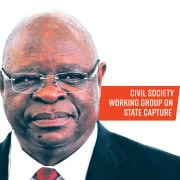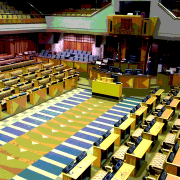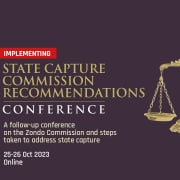|
Getting your Trinity Audio player ready...
|
The National Anti-Corruption Advisory Council (NACAC) has, through its chairperson Firoz Cachalia, made public some of the contents of its wish list for an anti-corruption body it proposed to President Cyril Ramaphosa in a mid-term report it submitted early this year.
Cachalia was a panellist in a discussion at the third state capture commission conference hosted by the Public Affairs Research Institute and the Council for the Advancement of the Constitution on Friday. He said NACAC wants to release its report – completed and submitted to the Presidency in March – to the public to kickstart discussions over its contents, but the body has encountered red tape that has prevented it from doing so.
What NACAC wants
What the council has in mind, Cachalia noted, is a body that will:
- be established as a Chapter 9 institution in accordance with the Constitution of the country, and be governed in that respect;
- be empowered to conduct audits, with powers of entry and search and seizure, allowing it to go into any institution with or without a presidential proclamation;
- have a mandate grounded on the principles listed in the Glenister case as constitutional requirements of such a body, and would thus be insulated from political process;
- investigate criminal corruption where it discovers it, focusing on the narrow occurrence, without encroaching on the mandate of the Directorate for Priority Crime Prevention (DPCI)
- be empowered to prepare dockets under the supervision of the National Prosecuting Authority to help speed up the investigative process;
- not exercise arresting powers, but where necessary will collaborate with the DPCI to bring suspects to book;
- be empowered to make public inquiries to meet the recommendations of the Zondo commission to establish a permanent body that will conduct investigations, but not act as a judicial commission;
- engage in public education projects; and
- have policy-making and monitoring capabilities in the interest of advancing the anti-corruption strategy.
“It would have to have the mandate to go into a hospital, conduct an audit – it might do that together with the auditor-general’s office or with Sars – including audits into the procurement systems, identify where the systemic weaknesses are, and then make binding recommendations,” said Cachalia.
“What we are proposing is that this body incorporates the Special Investigating Unit (SIU). It’s not the SIU in new clothes … it will have the powers the SIU currently has, but a considerably broader mandate to give effect to the ‘all government, all society’ approach.”
The new agency will also have a national footprint, just as the SIU has, and is aimed at adopting the advances that the SIU has already made in technology and data analytics, among others.
Red tape
NACAC looks forward to public engagements on its proposals, which Cachalia said had recently met some resistance from a grouping of senior government managers. He told the conference that the council’s work had stalled somewhat, due to lack of access to targeted leadership. NACAC, said Cachalia, had envisaged that the elections in May would place their work, and the process of addressing the report, on pause, and therefore completed it prior to the event. However, six months after the elections, and four months after the formation of government, they have yet to be invited before Cabinet to make the case for the report, which includes the core recommendations above.
The red tape that the council has encountered occurs at a time when some of the national departments seized with implementing the Zondo commission’s recommendations could benefit from proposals that speak to their direct mandates. Just a week prior to his address, Cabinet’s Justice, Crime Prevention and Security cluster met, and although he had been instructed by Ramaphosa that NACAC would be required to present before this meeting, the invite never came. This may have been due to oversight, Cachalia acknowledged, but was worrying nonetheless.
He told the conference that NACAC believes it has a solid proposal that addresses the country’s corruption problem, and the delay in hearing it means that its work is stagnated.
“It is our view of the council that there is no reason why, while the report is going through this governmental process, that it shouldn’t be released for public discussion and engagement. We’re also of the view that the pathway to Cabinet should be a clear one.”
He added that there is urgency in the council being able to complete its work and informing the work of the institutions it has made proposals on, because there is a cost to delaying counter-corruption measures in an environment where corruption as a phenomenon constantly evolves and grows.
Filling the gap
The council’s proposal, said Cachalia, has to be seen in the context of the “all government, all society” approach that has to date informed the work of NACAC. It’s an approach that assumes a broad idea of looking beyond government, but also mobilising society in the fight against corruption. “The gap we identified in the system is on the prevention side of systemic corruption, which is distinguishable from, but might include transactional corruption.”
Agreeing with fellow panellist Mazibuko Jara of the Zabalaza Pathways Institute, Cachalia said it was important too that the approach of NACAC be directed towards highlighting the basic needs analysis in the context of fighting corruption.
“We can do that by focusing on different sectors in the way you prioritise the fight against corruption. We’ve taken this into account in terms of establishing an institution to fill a gap on the prevention side of systemic corruption.”
Another panellist, Zukiswa Kota of the Public Service Accountability Monitor, noted in closing remarks that a separate discussion is necessary to unpack the funding and resourcing modalities that NACAC would have considered for the proposed agency.








